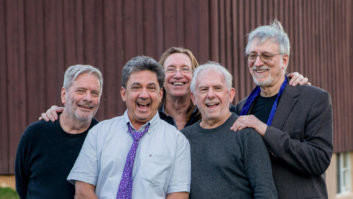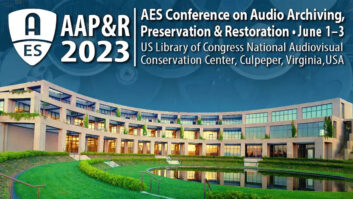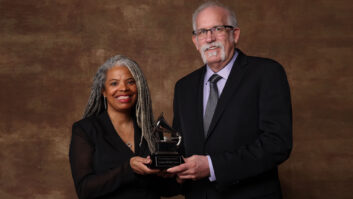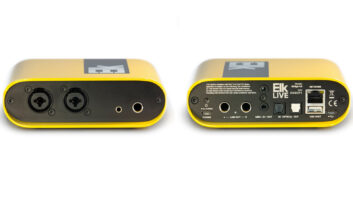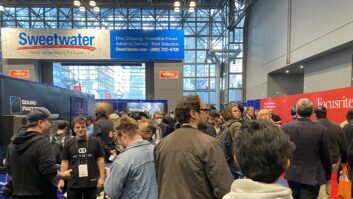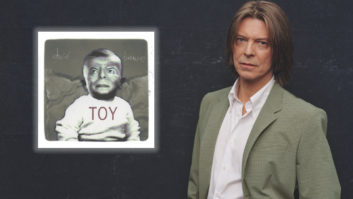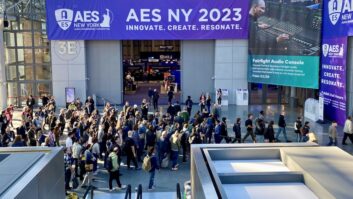New York, NY (October 17, 2019)—Terri Winston, executive director of the Women’s Audio Mission, put together an all-star panel of engineers to deconstruct the process of album production, discussing how projects move from pre-production to tracking and editing to mixing and mastering. The panel “Evolution of Album Production from Start to Finish” took place at AES 2019. In addition to Winston (who, in addition to her work with WAM, is a recording engineer, music producer and tenured professor of sound recording arts at City College of San Francisco), panelists included Gloria Kaba and Egypt native Heba Kadry, along with Grammy-nominated, multi-Platinum engineer, vocal producer and vocalist Simone Torres.
Panelists shared the influences that led them to their particular niche in the recording industry in front of a predominantly young audience, then discussed the importance of collaboration, why it often pays to be a nice person, and what the future holds for the audio industry.
Panelist Gloria Kaba is a freelance engineer who has found her niche with hip-hop artist and producer Q-Tip. Her recent credits include work on A Tribe Called Quest’s final album, We Got It from Here…Thank You for Your Service and Solange’s breakthrough release A Seat at the Table.
Kaba stressed the significance of education in her early career. Having grown up wanting to be a producer and songwriter, she found herself in Temple University’s communications program, which conveniently had a recording track. “I took as many recording classes as I could,” she said, adding that she soon learned the importance of internships. “I wanted to make sure I was investing my time and money into something I really wanted to do, so I started interning at Battery Studios. Right then I knew, okay, I’m going to be in the studio. And that is where I started to educate myself about recording.”
After graduation, Kaba got a job as an assistant engineer at Manhattan Sound Recording, where she spent six years working with engineers, producers and artists including Madonna, Beyoncé, Phil Ramone, Aretha Franklin and Frank Ocean. She said, “One of the aspects that makes me a successful engineer is that I am able to think as a producer and as a writer when I’m engineering. There is overlap. All of those [skills] inform the others.”
Egypt-born Heba Kadry found career inspiration upon hearing the Radiohead album Kid A in the early 2000s, though she had a suspicion that she’d have to leave her home country for a proper audio education. As she was coming to this conclusion, she was writing jingles at an ad agency, J. Walter Thompson in Cairo. While in the studio one day, she was struck with a realization: “I want to be the guy behind the glass,” she said. “I asked the recording engineer who was working on one of my jingles, ‘What do I need to be you?’ He said, ‘You need to go to audio school.’ So I did. It took me about a year and a half to make it happen.” She moved to the United States to study sound engineering at The Recording Workshop in Ohio.
Upon graduation, she took the internship route, saying, “I’m going to do as many internships as I can and stick it out and see how that goes.” One significant internship was at SugarHill Recording Studios in Houston, where she was eventually hired as a mastering engineer. It was here, at the company she describes as an “awesome studio,” that she discovered a key to early success. Of the experience, she said, “It made me realize, now looking in hindsight, that if you find a recording studio where the engineers are happy to teach you something and it’s a great environment, that’s the place to be. If you’re interning at a studio that’s toxic, nobody’s showing you anything and you’re making tea and coffee every day, do not stick it out.”
Simone Torres got started in the audio industry to solve a problem. Torres is now a Grammy-nominated, multi-Platinum engineer, vocal producer and vocalist who works as the protégé of five-time Grammy-winning vocal producer Kuk Harrell. She began her career as a singer but couldn’t figure out why she wasn’t finding satisfaction in her work.
“I had been in so many recording sessions, recording my own vocals, but I didn’t know how to communicate what I didn’t like. After so many years of performing, I didn’t have any recordings I was proud of. I was like, that’s silly. That doesn’t make any sense,” she said. That discomfort led her to Berklee College of Music, where she studied production engineering so she could learn for herself what wasn’t working. “That was why I got started, but throughout that journey I realized I didn’t want to be an artist. I was more interested in helping other people, other vocalists get something that they feel really happy with when they leave, but feel good while they’re recording, too.”
Torres learned about her mentor, Kuk Harrell, in one of her classes at Berklee. She said, “I tracked him down—it took two years—and I was like, okay, that’s who I want to work for. I just tried to gain all the skills that I could to make myself invaluable to somebody like that.” Torres has been working with him, helping artists create music they can be proud of, for four years.
As in any career, communication is key in the music production industry. In sharing her greatest pet peeve—disorganized clients who send a flurry of random notes with their mixes and expect her to sort it out—Kadry said, “You guys need to get it together. You want to arm me with all the right materials so I can do a good job.”
She explained that much of the job of a mastering engineer is managing expectations. “Some people think, ‘Oh, you’re going to fix everything.’ And you’re like, well, I can try, but let’s not make the mastering process the ‘fixing process.’ Let’s keep it at the cherry on top and the sweeting. Let’s get your mixes right first and then do the mastering.”
Kaba said that one of the keys to her success in the industry—her superpower, as it were—is that she’s generally likeable and easygoing. “It sounds really basic, but if you’re going to have to be in a room with someone for 16 hours a day, [their personality] is something that’s really important. It’s about being calm, being likeable, but also staying engaged.”
Kadry also emphasized the importance of good communication. After noting that a good mastering engineer is able to work like a chameleon—sonically invisible when requested, creatively daring when feasible—she described how the industry has evolved since she started, which may have been a welcome revelation for the mostly young audience.
“I came up in this kind of old-school generation of engineering where everybody was very secretive about their work. There was no sharing, everything was shrouded in secrecy,” Kadry said. “You grew up in this environment believing that that’s how you become good—by not sharing anything. I really hated that.” As she’s risen in her career, she’s remained staunchly opposed to that kind of thinking, preferring to share knowledge and ideas whenever possible.
She tied this idea in to the current status of the music industry, which she described as in trouble. “Budgets are shrinking. The streaming situation is absolutely horrific. Studios are shutting down. Engineering as a skillset is becoming more and more rare, people are dying, literally going away, and no one’s replacing them. The importance of sharing information, sharing what you do, it makes you part of the community. I think the community aspect is so crucial because that’s how we [as an industry] can continue.”
Torres continued that thought: “The tools that I use don’t make what I do. I do. It’s me. So I am very open to showing people things—people were very open to me when I started and I’m very grateful for that. I think it’s silly to just be like ‘This is mine, this is mine, this is mine,’ because then it just disappears. Be kind to people, everyone can win. What makes the difference between when I do something and when someone else does it? It’s me, as a person: everything I’ve been through and all the skills that I’ve gained along the way.”
